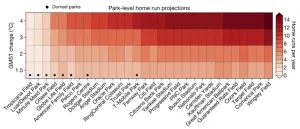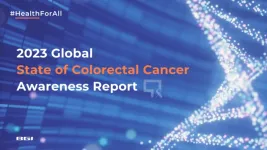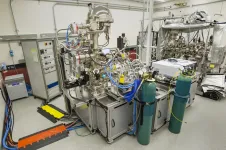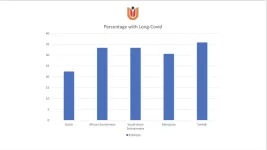(Press-News.org) A team led by Masaya Hagiwara of RIKEN national science institute in Japan has developed an ingenious device, using layers of hydrogels in a cube-like structure, that allows researchers to construct complex 3D organoids without using elaborate techniques. The group also recently demonstrated the ability to use the device to build organoids that faithfully reproduce the asymmetric genetic expression that characterizes the actual development of organisms. The device has the potential to revolutionize the way we test drugs, and could also provide insights into how tissues develop and lead to better techniques for growing artificial organs.
Scientists have long struggled to create organoids—organ-like tissues grown in the laboratory—to replicate actual biological development. Creating organoids that function similarly to real tissues is important for developing medicines, since it is necessary to understand how drugs move through various tissues. Organoids also help us gain insights into the process of development itself, and are a stepping stone on the way to growing whole organs that can help patients.
However, creating life-like organoids has proven difficult. In nature, tissues develop through an elaborate dance that involves chemical gradients and physical scaffolds that guide cells into certain 3D patterns. In contrast, lab-grown organoids typically develop either by letting the cells grow in homogeneous conditions—creating simple balls of similar cells—or by using 3D printing or microfluidic technologies, which both require sophisticated equipment and technical skills.
But now, in an initial paper published in Advanced Materials Technologies, the group from the RIKEN Cluster for Pioneering Research announced the development of a new, innovative technique that allows them to spatially control the environment around groups of cells based on cubes, using nothing more elaborate than a pipette.
The method involves confining layers of hydrogels--substances made up mostly of water--with different physical and chemical properties inside a cube-shaped culture vessel. In the study, different hydrogels were inserted into the scaffold using a pipette, and were held in place based on surface tension. Cells could be inserted into the cubes either within the individual hydrogels or as pellets that could move into the different layers, thus making it possible to create a range of tissue types.
In a second paper, published in Communications Biology, the group also demonstrated the ability to recreate what is known as body-axis patterning. Essentially, when vertebrates develop there is a head/rear and back/stomach patterning of cell differentiation. Though important for the creation of organoids that faithfully recreate what happens in actual organisms, this has been very difficult to achieve in the laboratory.
In this work, using the cube-based system, the group was able to recreate this patterning, using a mold cap to precisely seed a group of induced pluripotent stem cells (iPSCs) within a cube, and then allowing the cells to be exposed to a gradient of two different growth factors. They even went as far as to “recruit” a lab assistant and a junior high school student to successfully perform the work, showing that the seeding of the cells would not require a high level of expertise. The team also demonstrated that the resulting tissues could be sectioned for imaging and still maintain the information about the gradient orientation.
According to Hagiwara, “We are very excited by these achievements, as the new system will make it possible for researchers to quickly, and without difficult technical hurdles, recreate organoids that more closely resemble the way that organs develop in actual organisms. We hope that a range of researchers will use our method to create various new organoids and contribute to research on different organ systems. Eventually, we hope that it will also contribute to understanding how we can build actual artificial organs that can help patients.”
Hagiwara joined RIKEN in 2019 as a RIKEN Hakubi Fellow, a program that encourages talented young researchers to establish their own laboratories. His specific focus is on the development of lungs, but he emphasizes that the technology could be used for the creation of other types of organoids as well.
There is a video describing the system here: https://www.youtube.com/watch?v=_GFdZyUNcPU
END
Simple but revolutionary modular organoids
2023-04-07
ELSE PRESS RELEASES FROM THIS DATE:
New book explores possibilities of colonizing planets, moons and beyond
2023-04-07
Dan Răzvan Popoviciu new book New Worlds: Colonizing Planets, Moons and Beyond (published by Bentham Science) explores the possibilities of transforming humanity into a multi-planetary species, while also sounding an alarm about our long-term future. It emphasizes the importance of efficiently using Earth's resources and expanding beyond the planet's borders.
In the book, Popoviciu discusses how various planets, moons, and asteroids in the Solar System can provide important resources and become potential new home worlds for humans. The author goes beyond simple colonization and discusses solutions for terraforming ...
Spike in major league home runs tied to climate change
2023-04-07
In the history of Major League Baseball, first came the low-scoring dead-ball era, followed by the modern live-ball era characterized by power hitters such as Babe Ruth and Henry "Hank" Aaron. Then, regrettably, was the steroid era of the 1990s and early 2000s.
Now, could baseball be on the cusp of a "climate-ball" era where higher temperatures due to global warming increasingly determine the outcome of a game?
A new Dartmouth College study suggests it may be. A report in the Bulletin of the ...
Disease history doubles rate of colorectal cancer screening for family members | BGI Insight
2023-04-07
To uncover attitudes and the biggest challenges facing colorectal cancer (CRC) awareness and screening, BGI Genomics today released its State of Colorectal Cancer Awareness Report, marking the first-ever global survey report on the world's third most common cancer. This report is released on World Health Day, April 07, 2023, in line with achieving Health For All, and seeks to motivate action to tackle the health challenges of today and tomorrow.
This ...
Cedars-Sinai heart experts elected to lead, join prominent medical societies
2023-04-07
Two Smidt Heart Institute experts have been honored for their contributions to medical research by being inducted into select medical societies, while a third expert has been selected for a leadership position.
Cardiologist, echocardiographer and clinician-scientist Susan Cheng, MD, director of Cardiovascular Population Sciences in the Smidt Heart Institute and the Erika J. Glazer Chair in Women’s Cardiovascular Health and Population Science, has been elected to the American Society for Clinical Investigation (ASCI) Council. ASCI is regarded as the most prestigious ...
Internet access must become human right or we risk ever-widening inequality
2023-04-07
People around the globe are so dependent on the internet to exercise socio-economic human rights such as education, healthcare, work, and housing that online access must now be considered a basic human right, a new study reveals.
Particularly in developing countries, internet access can make the difference between people receiving an education, staying healthy, finding a home, and securing employment – or not.
Even if people have offline opportunities, such as accessing social security schemes or finding housing, they are at a comparative ...
Scientists use peroxide to peer into metal oxide reactions
2023-04-07
UPTON, NY— Researchers at Binghamton University led research partnering with the Center for Functional Nanomaterials (CFN)—a U.S. Department of Energy (DOE) Office of Science User Facility at Brookhaven National Laboratory—to get a better look at how peroxides on the surface of copper oxide promote the oxidation of hydrogen but inhibit the oxidation of carbon monoxide, allowing them to steer oxidation reactions. They were able to observe these quick changes with two complimentary spectroscopy ...
Biodiversity auditing key to success of new conservation plans
2023-04-07
New research led by the University of East Anglia (UEA) suggests a way to greatly improve the outcomes of biodiversity conservation efforts globally.
Scientists from UEA, the RSPB and Natural England, propose that biodiversity auditing should be integral to the ongoing development of regionally-targeted conservation plans, such as the Local Nature Recovery Strategies (LNRS) established by the UK Environment Act 2021.
It follows work conducted with two conservation projects in the East of England - one in North Norfolk and another in the Brecks - using this approach to guide conservation locally.
A biodiversity ...
Long-COVID a greater burden for migrant groups than the native population
2023-04-07
All prominent migrant groups in the Netherlands are suffering more from long-covid than the native Dutch population, research from Amsterdam UMC has found. The study, published today, in The Lancet Regional Health – Europe, shows that in some groups the rates of long-covid are up to 50% larger than in the Dutch population. Resulting in many migrant groups “suffering in silence,” in the words of senior author Professor Charles Agyemang.
COVID-19 has had a devastating impact on vulnerable communities, particularly people from ethnic minorities and migrant backgrounds. Research from Amsterdam UMC already found that these populations ...
Convenience, control among benefits that inspire automated feature use
2023-04-07
UNIVERSITY PARK, Pa. — People often complain about the occasional misfires of automated features, such as autocorrect, but users generally enjoy interacting with the tools, according to researchers. They added that focusing on certain benefits of automated features may help developers build automated tools that people use more and complain about less.
In a study, researchers said that users appreciate the convenience and control of automated features, which also include YouTube’s autoplay and Google Gmail’s smart compose. People listed the technology’s ...
Life-threatening childbirth complications among Medicaid enrollees vary widely by state and race-ethnicity
2023-04-07
The risk of life-threatening maternal complications from childbirth may be higher depending on where you live, a new study finds.
For Medicaid enrollees in Utah, the rate of “near miss” instances that could have led to the death of a birthing person during pregnancy or delivery was the lowest in the U.S., occurring among 80 per 10,000 live births.
Meanwhile, on the other side of the country in Washington D.C., the rate of such cases was nearly three times higher – 210 per 10,000 deliveries.
The drivers for these unexpected maternal outcomes, referred to as ...



